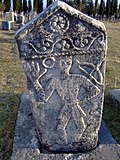Vranduk (Zenica)
Vranduk | |
|---|---|
Village | |
 Vranduk from just above the waterline of the Bosna river | |
| Coordinates: 44°17′34″N 17°54′14″E / 44.29278°N 17.90389°E | |
| Country | |
| Entity | Federation of Bosnia and Herzegovina |
| Canton | |
| Municipality | |
| Area | |
• Total | 2.19 sq mi (5.66 km2) |
| Population (2013) | |
• Total | 447 |
| • Density | 200/sq mi (79/km2) |
| Time zone | UTC+1 (CET) |
| • Summer (DST) | UTC+2 (CEST) |
| Website | Vranduk - zemuzej.ba |
| National Monument of Bosnia and Herzegovina | |
Vranduk is a historic village in the municipality of Zenica, Bosnia and Herzegovina.[1]
Geography
[edit]It is situated on the Bosna River canyon, just downstream from city of Zenica, at the site called the Vranduk Pass. The main road Sarajevo-Zenica-Doboj (M17) passes through the canyon and the village. On 14 February 1971 a rail crash in the tunnel near Vranduk occurred, 34 people were killed and 113 (60 serious) injured.[2]
History
[edit]
Archaeological excavations to date on the site of the fort showed no signs of fortifications dating from the prehistoric period or antiquity, or prior to the medieval times. The village itself is one of the oldest and well preserved settlements of Bosnia and Herzegovina, dating back to the 14th century and times of medieval bans and later kings of Bosnia. Vranduk village was established around a medieval citadel of the same name, and together constitute a protected architectural assembly, and as such it is a national monument of Bosnia and Herzegovina, well preserved and maintained in good condition by local and state commissions for national monuments, and managed by a local tourist organization. A small mosque was erected below the citadel after the Ottoman conquest of the Bosnian Kingdom which still is standing today in good condition. The mosque was dedicated to and named after Sultan Mehmed II, conqueror of Bosnia, and is also referred to as the Imperial Mosque or Emperor's Mosque.[3] In 1963, excavations were undertaken by Branka Raunig to explore the impact of the Roman empire on the village.[4]
Demographics
[edit]According to the 2013 census, its population was 447.[5]
| Ethnicity | Number | Percentage |
|---|---|---|
| Bosniaks | 445 | 99.6% |
| other/undeclared | 2 | 0.4% |
| Total | 447 | 100% |
Gallery
[edit]-
Vranduk, oil painting
-
Vranduk, map and info table
-
Vranduk, water-fountain
-
Vranduk, birdsview on the Vranduk Pass
-
Vranduk, citadel
-
Vranduk, approach to citadel
-
Vranduk, small mosque below citadel, dedicated to Sultan Mehmed II El Fatih also referred to as the Imperial or Emperor's mosque
-
Vranduk, village center below citadel
References
[edit]- ^ Official results from the book: Ethnic composition of Bosnia-Herzegovina population, by municipalities and settlements, 1991. census, Zavod za statistiku Bosne i Hercegovine - Bilten no.234, Sarajevo 1991.
- ^ "Fire Aboard Train in Yugoslavia Kills 34 and Injures 113". The New York Times. 15 February 1971.
- ^ "Commission for preservation of the national monuments" (.html). old.kons.gov.ba (in English and Bosnian). Retrieved 1 September 2016.
- ^ "Commission to preserve national monuments". old.kons.gov.ba. Retrieved 2020-05-17.
- ^ "Naseljena Mjesta 1991/2013" (in Bosnian). Statistical Office of Bosnia and Herzegovina. Retrieved February 27, 2022.
External links
[edit]- Historvius - Vranduk, Bosnia and Herzegovina ˙(History and Visitor Information)
- Ecoplan | Management Plan Archived 2022-01-24 at the Wayback Machine for conservation of the national monument Stari grad Vranduk
- Vranduk from air (Video 3 min. 21 sec. long)
- Populated places in Zenica
- National Monuments of Bosnia and Herzegovina
- Protected areas of Bosnia and Herzegovina
- Villages in the Federation of Bosnia and Herzegovina
- Architecture in Bosnia and Herzegovina
- Ottoman architecture in Bosnia and Herzegovina
- Islamic architecture in Europe
- Medieval Bosnia and Herzegovina architecture
- Zenica-Doboj Canton geography stubs











